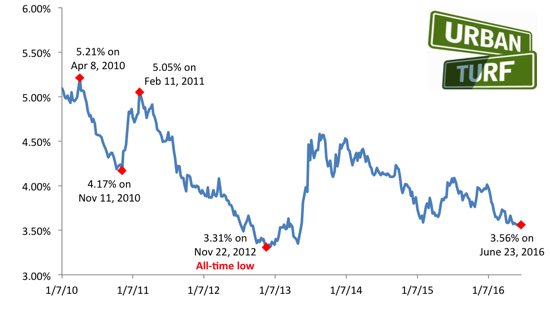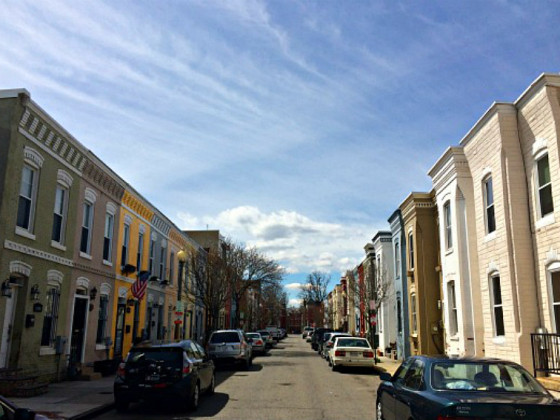What's Hot: A First Look At Friendship Commons, The Big Plans To Redevelop Former GEICO Headquarters
 Why a Brexit Could Mean Lower Interest Rates For Homebuyers
Why a Brexit Could Mean Lower Interest Rates For Homebuyers
✉️ Want to forward this article? Click here.

The trajectory of interest rates since 2010.
Long-term interest rates have been below 4 percent since the beginning of the year, and in the last two weeks, rates hit their lowest level since 2013. So, does the United Kingdom’s exit from the European Union mean that rates will fall even lower?
A quick primer on what influences interest rates. Long-term interest rates are tied to the yield on ten-year U.S. government bonds. Those bonds are tied to the Federal Reserve’s lending rate. So, when the Fed moves rates up or down, the interest rates on new home loans often follow suit.
At the end of last year, the Fed raised rates slightly and intimated that it would raise rates again in 2016. That has not happened, and on Thursday Fed Chair Janet Yellen indicated that if the U.K. voted to leave the EU there would be “significant economic repercussions.”
story continues below
loading...story continues above
In the immediate aftershock of the Brexit vote, the uncertainty could trigger a “flight to quality,” meaning capital floods into safe U.S. treasuries, temporarily pushing rates down on those and, by extension, mortgages.
In the medium term, and more relevant to DC homebuyers, is whether Brexit causes persistent economic uncertainty in Europe. This seems likely. The Fed, in an effort to avoid rocking the world’s economic boat, will keep rates low in that case. This would mean mortgage rates stay low or perhaps go lower.
See other articles related to: brexit, freddie mac, interest rates, mortgage rates, mortgages
This article originally published at https://dc.urbanturf.com/articles/blog/why_a_brexit_could_mean_lower_interest_rates_for_homebuyers/11400.
Most Popular... This Week • Last 30 Days • Ever

On Thursday night, developer EYA outlined its plans at a community meeting for the 26... read »

EYA and JM Zell Partners have plans for 184 townhomes and 336 apartments spread acros... read »

Today, UrbanTurf is taking our annual look at the trajectory of home prices in the DC... read »

Chris Hughes and husband Sean Eldridge are putting their Kalorama home on the market ... read »

If the walls of 1222 28th Street NW could talk, they'd have nearly three centuries wo... read »
- A First Look At Friendship Commons, The Big Plans To Redevelop Former GEICO Headquarters
- 520 Residences Planned For Former GEICO Campus In Friendship Heights
- The 10-Year Trajectory Of DC-Area Home Prices In 4 Charts
- Facebook Co-founder Lists DC Home For Sale
- One of DC's Oldest Homes Is Hitting the Market
DC Real Estate Guides
Short guides to navigating the DC-area real estate market
We've collected all our helpful guides for buying, selling and renting in and around Washington, DC in one place. Start browsing below!
First-Timer Primers
Intro guides for first-time home buyers
Unique Spaces
Awesome and unusual real estate from across the DC Metro














